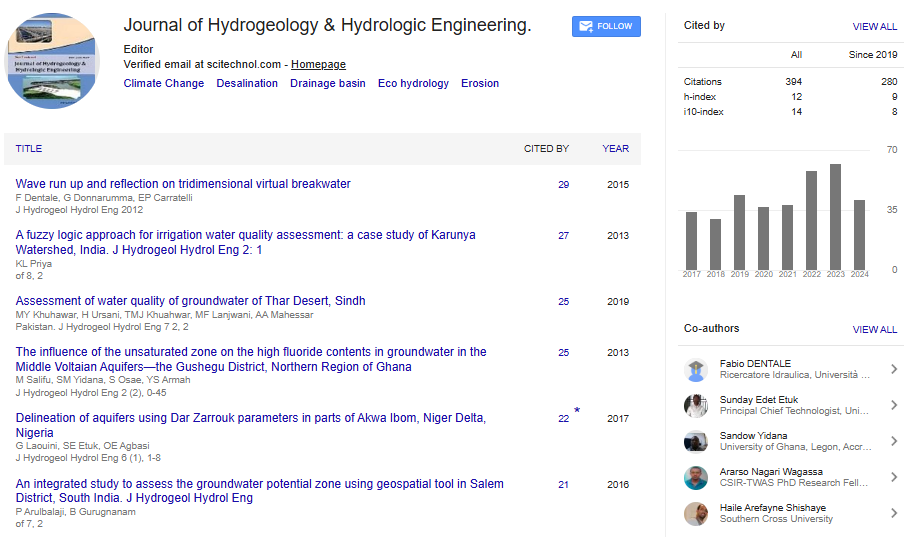Opinion Article, J Hydrogeol Hydrol Eng Vol: 13 Issue: 4
The Dynamics of Hydrochemistry Systems in Aquatic Systems
Jihye Kim*
1Department of Environmental Science, University of Barcelona, Catalonia, Spain
*Corresponding Author: Jihye Kim,
Department of Environmental Science,
University of Barcelona, Catalonia, Spain
E-mail: kimj378@gmail.com
Received date: 29 July, 2024, Manuscript No. JHHE-24-149249;
Editor assigned date: 31 July, 2024, PreQC No. JHHE-24-149249 (PQ);
Reviewed date: 14 August, 2024, QC No. JHHE-24-149249;
Revised date: 21 August, 2024, Manuscript No. JHHE-24-149249 (R);
Published date: 29 August, 2024, DOI: 10.4172/2325-9647.1000
Citation: Kim J (2024) The Dynamics of Hydrochemistry in Aquatic Systems. J Hydrogeol Hydrol Eng 13:4.
Description
Hydrochemistry involves the study of chemical processes and compositions within water systems, playing a vital role in various environmental and engineering fields. By examining the interactions between water and surrounding materials, hydrochemistry offers insights into the health of ecosystems, the availability of clean drinking water and the implications for water resource management. The field connects the physical, chemical and biological aspects of water to address a variety of scientific and societal challenges.
At the heart of hydrochemistry are natural waters, including rivers, lakes, groundwater and oceans. These bodies of water contain dissolved minerals and gases, which interact in complex ways depending on both external and internal factors. One significant factor is the geology of the region. Rocks, soil and other geological formations influence the mineral content of water through processes such as weathering, dissolution and sediment transport. For example, calcium and bicarbonate ions are often present in water systems passing through limestone regions, which can impact the hardness of water. This natural mineralization process is a fundamental aspect of hydrochemical studies.
Human activities also exert considerable influence on water chemistry. Industrial pollution, agricultural runoff and urban wastewater discharge introduce chemicals into natural water systems, often resulting in contamination. Excessive nitrates from fertilizers, heavy metals from industrial waste and organic pollutants like pesticides can disrupt aquatic ecosystems. Monitoring and moderating these pollutants is a key aspect of hydrochemical research, as contaminated water poses risks to human health, biodiversity and ecosystem stability.
Another essential area within hydrochemistry is the study of water quality for human consumption. Water quality standards vary based on intended use, whether for drinking, agricultural irrigation, or industrial applications. Scientists analyze chemical concentrations in water, such as pH levels, salinity, dissolved oxygen and the presence of harmful substances. For drinking water, excessive levels of certain ions like arsenic, fluoride, or lead can result in significant health issues. Hydrochemistry aids in the identification of water sources that meet safety standards and in developing treatment solutions for contaminated water.
The movement of water through different environments, such as rivers, groundwater systems and the atmosphere, also plays a pivotal role in its chemical makeup. As water flows, it transports dissolved materials and interacts with atmospheric gases, like carbon dioxide, which affect its acidity and alkalinity. This dynamic process, known as the hydrological cycle, allows for continuous exchange between surface water, groundwater and the atmosphere. Each stage in this cycle contributes to changes in water chemistry, influencing factors such as nutrient levels, pollution dispersal and chemical equilibrium.
Hydrochemistry is also integral to understanding climate change and its impact on water systems. Rising temperatures lead to changes in precipitation patterns, melting of glaciers and increased evaporation, all of which alter the chemical characteristics of natural waters. These changes can exacerbate issues like salinity in coastal aquifers, nutrient depletion in freshwater bodies and the acidification of oceans. Scientists utilize hydrochemical data to track these trends and develop predictive models for future water availability and quality.
In addition to environmental concerns, hydrochemistry has applications in industrial processes. Water is a key resource in industries such as mining, agriculture and energy production. Hydrochemical analysis helps in the selection of water for industrial use by determining its suitability and identifying potential treatment needs. For example, in cooling systems for power plants, water with high mineral content can cause scaling, which affects efficiency. Similarly, hydrochemical studies help manage water usage in agriculture by ensuring that irrigation water does not adversely affect crop health.
Overall, hydrochemistry provides valuable insights into the interactions within aquatic systems and their implications for both natural ecosystems and human activities.
 Spanish
Spanish  Chinese
Chinese  Russian
Russian  German
German  French
French  Japanese
Japanese  Portuguese
Portuguese  Hindi
Hindi 
